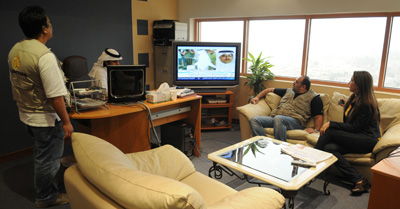On Wednesday, the station aired footage of uniformed security forces using batons to beat opposition members of parliament and citizens at a protest in Kuwait City on Wednesday. The demonstration was against alleged government plans to amend Kuwait’s 1962 constitution that would “suppress freedom and democracy,” Agence France-Presse reported. During the rally, security forces severely beat Mohamed al-Sindan, a journalist for Al-Seyassah daily, according to the daily Al-Qabas.
Hassan Saeed Elmogummer Taha, a news producer with Al-Jazeera, told CPJ that the Ministry of Information called the station’s office in Kuwait on Friday and warned that the ministry would close the office if Al-Jazeera interviewed opposition MP Musallam al-Barrak. “We informed the ministry that we don’t take editorial guidelines from governments,” Taha told CPJ. The interview with al-Barrak aired on Sunday.
Faysal al-Mutlaqim, the director of the department of audiovisual media at the Ministry of Information, said today that “the withdrawal of the station’s license and the closure of its office was a ministerial decision following the station’s broadcast of recent events in Kuwait, and the meddling in internal affairs, despite warnings previously sent by the ministry to all media not to publish or broadcast any news about recent events and not to raise the issue,” KUNA reported.
“We call on Kuwaiti authorities to allow Al-Jazeera to immediately resume its operations and to reinstate all staff accreditations,” said Mohamed Abdel Dayem, CPJ’s Middle East and North Africa program coordinator. “It is deeply ironic that the government should acknowledge publicly and without any apparent embarrassment that it is closing the Al-Jazeera bureau because the journalists there did their jobs. Publishing news about ‘recent events’ is pretty much a good description of what journalists do every day.”
Since its inception in 1996, Al-Jazeera has been subjected to closures in virtually every country in the region. Its operations are currently suspended in Morocco and Bahrain in addition to Kuwait, CPJ research shows. Taha told CPJ that Al-Jazeera will continue covering Kuwait from its other bureaus in the region.
Over the past year, Kuwait has witnessed a notable decline in press freedom. Currently, Mohamed Abdulqader al-Jassem, a Kuwaiti journalist and writer, is in prison in connection to a critical article he wrote about Kuwaiti Prime Minister Sheikh Nasser Mohammad al-Ahmad al-Sabah. In all, al-Jassem is facing 18 criminal cases in relation to his critical articles.
